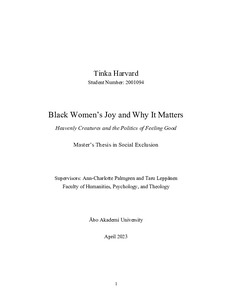Black Women's Joy and Why It Matters : Heavenly Creatures and the Politics of Feeling Good
Harvard, Tinka (2023)
Julkaisun pysyvä osoite on
https://urn.fi/URN:NBN:fi-fe2023042638890
https://urn.fi/URN:NBN:fi-fe2023042638890
Tiivistelmä
This master’s thesis is a study of the phenomena of Black women’s joy what it is, why it matters, and how it is helpful in resisting oppression, including racism, sexism, and social exclusion. It is an attempt to grasp the scope of the social exclusion of Black women in anti-Black and sexist dominant cultures. The Black experience entails learning through specified and insinuated language what one can and cannot do according to the barriers and rules of the dominant culture. Those social norms and ways of being are written and unwritten, and a tone policing exists by the dominant culture to reinforce said norms. The importance of this research aims to explore what Black women’s joy is and how Black women’s joy pushes back on the policing of Black women’s existence and the gender inequalities they experience. It resists the boxes or cages systemically created for Black women. The topic was inspired by the reality of how within the Black experience there is a necessity to navigate oppressive terrain that leaves Black women emotionally, physically, and mentally exhausted and traumatised. Black women choosing to live with joy is a radical act. Thus, Black women’s joy, why it matters, and how it helps in resistance against oppression is a rigorous act of love. Personal experiences depicted via poetry, vignettes, and traditional academic writing is used to share the research and its findings. The vignettes as well as poetry are created from diary entries, which are a record of the researcher’s personal experiences of a Black American woman in general and while living as an international student in Finland in particular.
The theories of social exclusion, affect theory, feminist theory, social interaction, and social construction are used as a lens to view and better understand the extent of the marginalisation of Black women and how Black joy is effective as resistance to oppression. The materials for this thesis are personal accounts, autoethnographical material, that have been transformed into a suite of poetry that has been analysed using the methods of autoethnography and poetic inquiry. Experiences related to racial and gender inequality and social exclusion leave Black women with a particular trauma and exhaustion while simultaneously equipping them with particular skills that can lead them from trauma to triumph. Negative experiences can be transformed into positives. Black women’s lived experiences help them to understand their own power. When looking closely at Black women’s journeys of inequity and social exclusion, it is evident that they often acquire tools to handle adversity. There is a connection between one’s own trauma and learning to navigate unfavourable environments. Being able to experience and share joy is especially needed for Black women who are constantly inundated with inhumane acts of racism, sexism, and social exclusion. In response to such substantial issues, the message that “Black joy is an act of resistance” is central to their fight against oppression.
The theories of social exclusion, affect theory, feminist theory, social interaction, and social construction are used as a lens to view and better understand the extent of the marginalisation of Black women and how Black joy is effective as resistance to oppression. The materials for this thesis are personal accounts, autoethnographical material, that have been transformed into a suite of poetry that has been analysed using the methods of autoethnography and poetic inquiry. Experiences related to racial and gender inequality and social exclusion leave Black women with a particular trauma and exhaustion while simultaneously equipping them with particular skills that can lead them from trauma to triumph. Negative experiences can be transformed into positives. Black women’s lived experiences help them to understand their own power. When looking closely at Black women’s journeys of inequity and social exclusion, it is evident that they often acquire tools to handle adversity. There is a connection between one’s own trauma and learning to navigate unfavourable environments. Being able to experience and share joy is especially needed for Black women who are constantly inundated with inhumane acts of racism, sexism, and social exclusion. In response to such substantial issues, the message that “Black joy is an act of resistance” is central to their fight against oppression.
